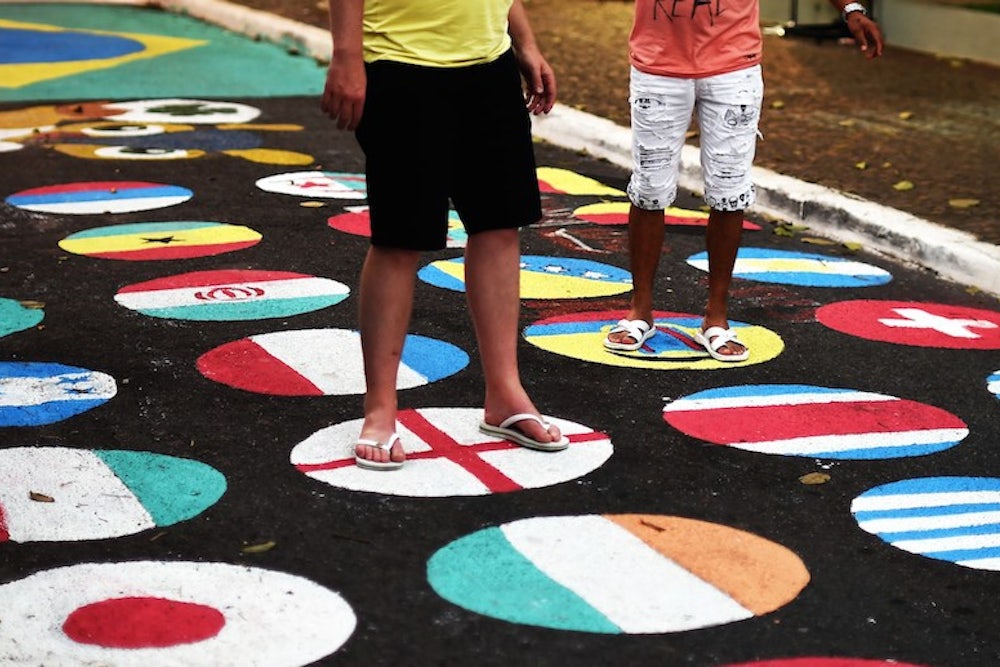The great thing about watching the World Cup in Bosnia—or anywhere outside the U.S.—is the relentless ubiquity of it. It is everywhere and in everything. Football (Mr. Schama is right!) permeates the fabric of daily life so thoroughly that it pushes all else into its corners. There are screens all over Sarajevo; everyone talks about football: the fantasy foul occasioning the penalty gift for Brazil, what to expect against Argentina, what bets were placed, what were the odds (there are a plethora of betting joints all over the city). Taxi drivers, who like it when you sit in the passenger seat so they can talk to you, freely offer unsolicited tactical analysis, based largely on ingrained national stereotypes and delusional wishful thinking.
On Friday night I watched Spain-Holland in a restaurant (Pod lipom—Under the Linden Tree) whose management put up a screen on the wall across the pedestrian pathway and cranked up the sound system, assuming (correctly) that everyone would be interested. Passers-by, walking at their peril between the patrons and the screen, checked the score, slowing down to see the replay of Van Persie’s goal. The waiters, trays in hand, stopped mid-step for the replay of Robben’s bullet-train acceleration past Piqué, who aged out of professional soccer in the seven seconds or so it took the bullet-headed Dutchman to score. Because the (Bosnian) friends I was with audibly rooted for Spain, which included shouting insults at the Dutch projections on the screen, one of the waiters told us after the game that he was sorry Spain lost, but that his team for the night was Holland. Half of the Dnevni avaz front page was devoted to the humbling of the World Champions, the 100-point title announcing that The Dutch Demolished the Spaniards. Next to it, taking a tenth of the space given to the game, a headline addressed the possibility that, as early as Monday, Bosnia might find itself without natural gas supplies, since Russia seems bent to shut off the flow to Ukraine, which is the way for the gas to reach these parts. With that particular issue, the layout seemed to suggest, we’ll deal after the great Dutch performance is fully processed, certainly after Bosnia’s game with Argentina. The hierarchy of reality is reshuffled so that football is perched on the top.
The world, in other words, becomes, briefly, the utopian place in which we’re all bizarrely connected—everything and everyone is everywhere—and somehow comfortable with that. It is a valuable experience for a place like Bosnia, where comfort, like natural gas, is often in short supply. There was a Dutch couple at Pod lipom, who objected to the management about the absence of their national flag among those adorning the restaurant’s awning and the wall with the screen. It was because, they were told, the Chinese suppliers didn’t know what the flag of Holland looked like. (They even printed the Bosnian flag upside down—to paraphrase Mr. Stavans, God made the World Cup to teach and confuse Chinese suppliers about geography.) The manager decided not to mention Srebrenica with the Dutch (in 1995 a Dutch battalion under the U.N. flag delivered people they were supposed to protect in Srebrenica to the Serbs, who then shot them.) She didn’t want to spoil the game for them. She did tell a couple of Argentine patrons that she believed Bosnia might beat them.
After the game, I went home, but my friends went to a club owned by their high-school friend to watch the Chile-Australia game. Their friend was born in Chile, which his family escaped after the 1973 coup and Allende’s murder to resettle in Bosnia. During the Bosnian war, he and his brother stayed in Chile with their family, but then returned to Sarajevo. Which is to say that, last night, all the Chileans in Sarajevo (about four) were belting out their national anthem clad in their national-team jerseys.
The world is fully present wherever you look, but the World Cup makes that inescapably obvious.
